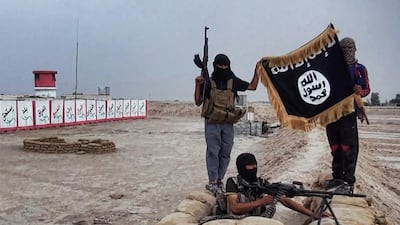On Friday, Hasaka became the second Syrian province to be fully liberated from ISIL in two years, after Idlib around this time in 2014. According to local reports, the group’s withdrawal from its last stronghold in Hasaka was “swift and surprising”. This sudden defeat, which follows similar ones in recent months, raises questions about the group’s current capabilities.
ISIL’s loss of Shaddadi, its last outpost in Hasaka, is significant and symbolic. This was the town from where, in 2014, the group planned much of its effort to take or secure its control of Syrian territory. Jabhat Al Nusra, Al Qaeda’s affiliate in Syria, crumbled there after most of its fighters switched sides when Abu Bakr Al Baghdadi announced the formation of ISIL. The city was the planning centre for ISIL, and there were rumours that Mr Al Baghdadi had visited it a few times.
The defeat is also operationally remarkable. The group has now lost control over oilfields – about 200 small oil wells and major oilfields such as Jibisa and Kabibah – and critical areas that could potentially weaken its defences in Deir Ezzor, Raqqa and even Mosul.
A day after the loss of Shaddadi, the Syrian regime announced that it had retaken from ISIL the thermal power station in Aleppo's eastern countryside, near Al Bab, one of the group's bastions. Losing the power station is a blow to ISIL as it helps the regime secure the Kweiris airbase, 15km away, the midpoint between Aleppo and Raqqa. Dubai-based Orient News reported that ISIL lost control of 25 villages between Kweiris and the thermal power station.
The defeats in Hasaka and Aleppo could threaten ISIL’s heartlands, especially since it has been driven out of areas to the north, east and west of Raqqa. Its withdrawals from Tal Abyad in June, a vital border outpost for ISIL, and from areas in southern Hasaka in November were similarly described as swift, with the group hardly putting up a fight. The same was said of its defeat in Sinjar.
Such moves are a stark departure from its strategy in Kobani two years ago, when the group sent hundreds of its recruits to fight in a losing battle as the terrain was exposed and the US-led air campaign had just started in Syria. Several reasons could be put forward to help explain the sudden defeats.
ISIL could have decided after Kobani that everywhere the US-led coalition concentrates its air strikes, the fight becomes an issue of depletion that it should avoid. But if that is the case, why did it not follow the same script in the Iraqi cities of Tikrit and Ramadi? Instead of allowing the approaching Kurdish-led forces, known as the Syrian Democratic Forces (SDF), to essentially walk into the city, ISIL could have resisted inside the city and repeated its previous patterns in Iraq, where a city would be almost destroyed by the time the extremists left.
Another possible reason is that the group simply does not have enough manpower to sustain a fight, despite its control of the population for 21 months. It was clear since November that Shaddadi was next for the SDF in Hasaka, so ISIL had time to prepare for the fight, bolster its defences and turn the town into a fortress to distract and deplete the SDF.
But there is a more likely reason behind such quick withdrawals. ISIL might be seeking to increase fears in Turkey by concentrating its capabilities in areas it regards as priorities and allowing the Kurds to expand in Hasaka and near the Turkish borders in Raqqa.
Nearly all the sudden defeats were inflicted by the Kurds. With ISIL’s defeat in Hasaka, the Kurdish areas in both Syria and Iraq are better linked than ever before. Notwithstanding the differences in ideology and interests between the Kurds on both sides of the border, the idea that Iraqi and Syrian Kurdistan has become a visible reality will surely worry not only Turkey but also Iran, because the two countries fear a similar scenario at home.
Dividing its enemies is one of ISIL’s signature tactics. It is worth remembering that after its takeover of Mosul and a large expanse of areas in Iraq and Syria, the group suddenly shifted towards the Kurds in both of these countries, in Erbil and Kobani. The group’s calculation then was that the Kurds had too many enemies, in Iraq, Iran and Syria, and Turkey would allow Kobani to fall. But that turned out to be a blunder, perhaps ISIL’s worst blunder yet.
The Syrian rebels who fought ISIL, and often defeated it, doubt that the group was too weak to be driven out of Tal Abyad and key areas in southern Hasaka without a fight. The Syrian regime, despite its air capabilities and the help of Russian air strikes, has also failed to secure areas near ISIL, such as in Deir Ezzor. It is unlikely that the group had no forces to fend off the SDF attack in those areas – the forces simply fell back to Deir Ezzor – nor was it likely that the group did not find it tactically useful to deplete the Kurdish forces in Hasaka.
ISIL has clearly weakened over the past year, thanks in large part to the US-led air strikes. But weakness does not mean the group is unable to plan, divide and endure.
Hassan Hassan is a resident fellow at the Tahrir Institute for Middle East Policy, a think tank in Washington, DC, and co-author of ISIS: Inside the Army of Terror
On Twitter: @hxhassan

